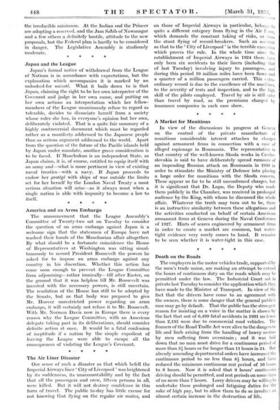Japan and the League Japan's formal notice of withdrawal from
the League of Nations is in accordance with expectations, but the explanation which accompanies it is marked by an unlooked-for naïveté. What it boils down to is that Japan, claiming the right to be her own interpreter of the Covenant and judge in her own cause, and putting on her own actions an interpretation which her fellow- members of the League unanimously refuse to regard as tolerable, decides to dissociate herself from a society whose rules she has, in everyone's opinion but her own, deliberately violated. That is a quite fair summary of a highly controversial document which must be regarded rather as a manifesto addressed to the Japanese people than as serious argument addressed to the world. Apart from the question of the future of the Pacific islands held by Japan under mandate, another grave consideration is to be faced. If Manchukuo is an independent State, as Japan claims, it is, of course, entitled to equip itself with an army and—what is more pertinent in view of existing naval treaties—with a navy. If Japan proceeds to endow her protegé with ships of war outside the limits set for her herself by the London Naval Treaty a most serious situation will arise—as it always must when a single nation is able with impunity to become a law to itself.
* * *








































 Previous page
Previous page